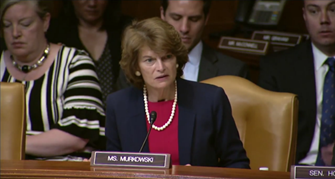Murkowski Questions Military Leaders on U.S. Strategy in the Arctic
The Senate Defense Appropriations Subcommittee recently held a hearing to review the FY19 Budget Request for the U.S. Department of Defense. During the hearing, Senator Lisa Murkowski questioned Secretary of Defense James Mattis and Chairman of the Joint Chiefs of Staff General Joseph Dunford about our strategic military presence in the Arctic.
“In the past 10 years we have seen the Russians move dramatically, and actually in the past year even more so. And yet, our U.S. Arctic strategy has yet to evolve to this changing dynamic. And the concern that I have is, rather than the Arctic being a place for commerce, a stable area with freedom of maneuver, that Russia is positioning themselves to control the Arctic, control its resources, control the sea lanes. And if the northern sea route becomes a major shipping lane, Russia is poised to be that sole power that could effectively sanction or threaten to coerce, project power,” said Senator Murkowski. “I am reluctantly coming to the impression that the Department of Defense does not have a coherent vision for addressing America’s defense interests in the changing Arctic at this point in time.”
Senator Murkowski questioned Secretary Mattis and General Dunford on their approach to ensuring a U.S. presence in the Arctic.
(Click image to watch video of the hearing)
“The United States, Canada, Norway, Denmark – all NATO allies. You can see that our approach is heavily involved with those allies when you look at the Arctic Council makeup. So the more that we work by, with, and through allies, including several Denmark and Norway, that keep a very close eye on the North, we are in effect working in a coalition of sorts right now,” said Secretary Mattis. “At the same time you will see new icebreakers coming into the Coast Guard inventory…There’s an effort to make certain what we are doing is with others so that we are not carrying the full financial or military costs.”
“Speaking at it from a military perspective, you know in the 1990s we actually developed regional strategies so that there’d be focus on the Arctic, the Pacific, and the Atlantic. The Global Campaign plans that we’ve developed right now, which are classified, take a problem-set approach. So we have a global campaign plan for Russia, which accounts for their military capabilities they have postured in the Arctic, and so our plans no longer focus specifically geographically,” said General Dunford. “For example in the 1990s we might have had a plan specifically focused on defending the Baltics, we now take a broader approach to the full range of challenges that Russia provides. And so I would argue at least at the military level that the Arctic is fully included in our global campaign plan for Russia, specifically the military capabilities that they have postured in the Arctic and the threat that they pose.
Murkowski has raised the issue of the Arctic as a national priority in every appropriations hearing she has participated in.









